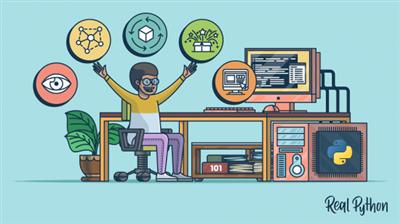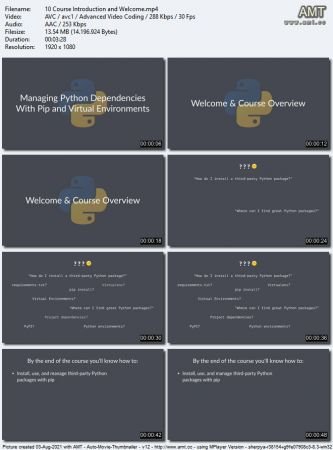MP4 | Video: h264, 1920x1080 | Audio: AAC, 44.1 KHz, 2 Ch
Genre: eLearning | Language: English | Duration: 37 Lessons (1h 59m) | Size: 473.3 MB
Managing Python Dependencies is your "one-stop shop" for picking up modern Python dependency management practices and workflows with minimal time investment.
The course consists of 32 bite-sized video lessons, each focusing on a single concept. Progressing through the course, you'll quickly build up a comprehensive knowledge of dependency management best practices in Python at your own, comfortable pace.
Along the way, you'll see hands on examples and step-by-step workflows that reinforce the skills you're learning.
By the end, you'll know how to apply Python's recommended dependency management tools, like pip, virtualenvs, and requirements files effectively in the most common day-to-day development scenarios on Linux, macOS, and Windows.
With Managing Python Dependencies you will:
Code at a higher level and become more efficient: Leveraging Python's rich third-party library ecosystem let's you write better programs in a shorter amount of time. With a large body of freely available modules you can avoid reinventing the wheel and deliver higher quality Python software, faster. This is a great way for you to demonstrate senior level skills that will benefit your development career.
Get up to speed with Python dependency management quickly: Your time is your most important asset. If you can use it efficiently you will save your sanity-and a nice stack of money. This course is concise but thorough and will help you attain solid Python dependency management knowledge fast.
Go from "writing scripts" to "building applications" with Python: By taking advantage of Python's rich packaging ecosystem you'll be able to build substantial and full-featured applications in Python. You'll know the best practices for finding and documenting application dependencies that put you right on track for deploying and shipping production-grade apps.
Find great libraries for a specific task at hand: This course teaches you a unique 7-step workflow for finding and identifying quality Python packages. Find out which libraries and tools are available on PyPI to help you. By quickly and easily identifying the correct libraries you'll speed up your development efficiency by a large margin. Meet your deadlines and write better code at the same time by not having to "reinvent the wheel."
Master "the tools of the trade" for dependency management: With this course you'll master the tools and workflows recommended by the official Python Packaging Authority. By getting those skills under your belt you'll be ready to work with the Python development and production environments used by professional development teams across the world. Knowing these "tools of the trade" by heart puts you at an advantage in any job interview situation.
"Productionize" your projects and share them with the world: You'll see how to apply the best practices for defining and installing package dependencies in Python. You'll know how to get your programs ready to be deployed on production and automated testing environments and how to make it easy for other developers to contribute code with minimal setup effort.
Become more valuable as an employee and team member: With my detailed 7-step workflow for researching quality Python packages you'll know how to document and justify added program dependencies to your team and your manager. By taking on more responsibilities and picking up these senior-level "architectural" skills you'll rise head and shoulders above other devs stuck at the "code monkey" level.
Who Is This Course For?
This course is for Python developers wanting to break through to the next phase of developing code by becoming more efficient, productive, and skilled using Python's rich library ecosystem.
If you've ever caught yourself thinking "There's got to be a Python package out there that does exactly what I want...But how do I find it?" this course will fill in the missing pieces for you.
Discover the industry best practices around choosing and managing third-party dependencies for your Python 2 or Python 3 projects on Windows, macOS, and Linux.
If you already know how to use alternative package managers like Conda you'll discover how to use the standards-compliant tools and workflows supported by any Python distribution and used in most production application deployments.
Course Goals
By the end of the course you'll know how to:
Install, use, and manage third-party Python packages with the "pip" package manager on Windows, macOS, and Linux.
Isolate project dependencies with so-called virtual environments to avoid version conflicts in your Python projects.
Apply a complete 7-step workflow for finding and identifying quality third-party packages to use in your own Python projects (and justifying your decisions to your team or manager.)
Set up repeatable development environments and application deployments using the "pip" package manager and requirements files.
Download link:Kod:rapidgator_net: https://rapidgator.net/file/ea976815f952edf82dc575540602c104/ysrge.Real.Python..Managing.Python.Dependencies.rar.html nitroflare_com: https://nitroflare.com/view/266521FED06B818/ysrge.Real.Python..Managing.Python.Dependencies.rarLinks are Interchangeable - No Password - Single Extraction
1 sonuçtan 1 ile 1 arası
-
03.08.2021 #1Üye



- Üyelik tarihi
- 20.08.2016
- Mesajlar
- 144.947
- Konular
- 0
- Bölümü
- Bilgisayar
- Cinsiyet
- Kadın
- Tecrübe Puanı
- 153
Real Python - Managing Python Dependencies
Konu Bilgileri
Users Browsing this Thread
Şu an 1 kullanıcı var. (0 üye ve 1 konuk)



 LinkBack URL
LinkBack URL About LinkBacks
About LinkBacks






 Alıntı
Alıntı
Konuyu Favori Sayfanıza Ekleyin